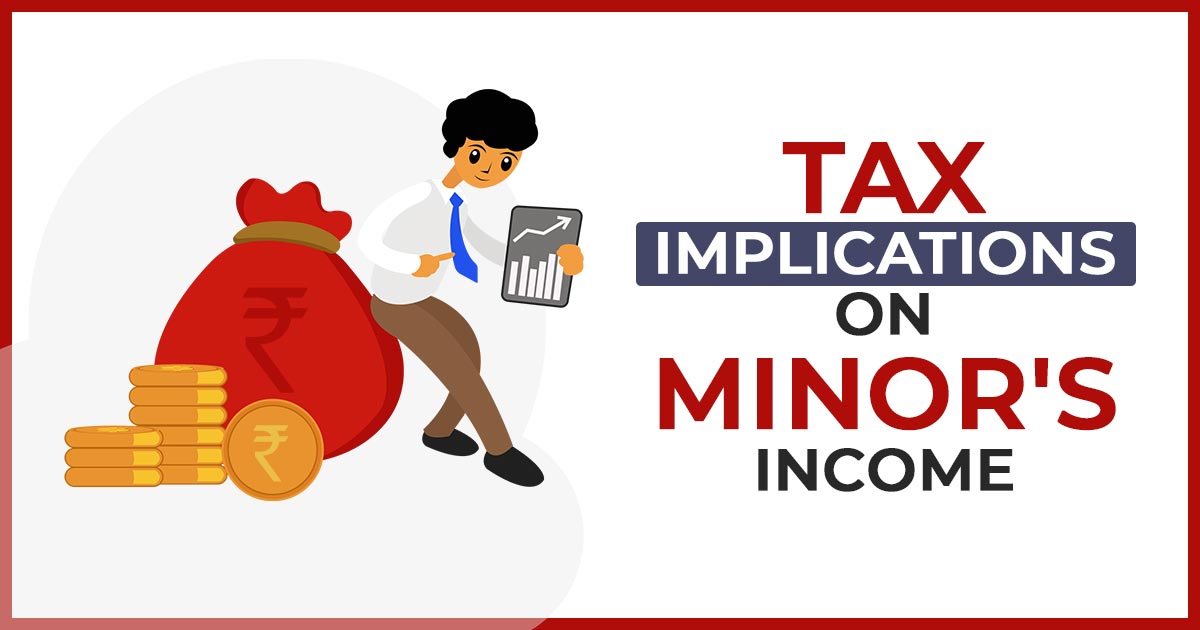
Nowadays, it has become a common thing to invest in the name of minor children, whether it’s through fixed deposits, insurance policies, or government schemes. However, if any of these investments generate income, such as interest from a fixed deposit, it raises the question of tax implications on the child’s income.
Individuals below the age of 18 are considered minors and can earn income from savings accounts, fixed deposits, or other investments through their name by their parents. Any income earned by a minor is added to the parent’s income, a process known as clubbing of income.
Consequently, the taxes on this income are paid in the same manner as the parent’s income. However, such a parent is eligible to claim an exemption of Rs.1500/- per child.
Let’s delve into this matter further using a hypothetical example to make it easy for you to understand. Suppose a daughter receives a gift of a fixed deposit worth ₹6 lakh from her grandfather, which generates an interest income of ₹45,000. The daughter’s father earns ₹26 lakh, while the mother earns ₹24 lakh. If both parents are earning, the child’s income will be clubbed with the parent whose income is higher.
Therefore, the daughter’s income of ₹45,000 will be added to her father’s income. (since the money received is a gift and not income earned thus need not pay tax on such gift amount of Rs.6 Lakhs)
However, in the case of divorced parents, the minor’s income is added to the parent who has custody of the child. It’s worth noting that the parent can claim a tax exemption of ₹1,500 for each minor child whose income is clubbed.
Taxation rules differ when it comes to children who earn income from acting, advertisements, and similar sources. There are some scenarios where the income of minors is taxed separately instead of being clubbed with the parent’s income. If the minor has earned income based on their skills, knowledge, or talent, a separate income tax return must be filed by the minor’s parent or guardian as the representative assessee. Thus, in the case of child artists, their parents must file another income tax return.
A similar situation applies to children who win TV shows like Little Champ, Master Chef Junior, and others. If the generated earnings by the minor are sourced from manual work, they will be reported only in the minor’s return and will be subject to tax in their name.
Now, let’s consider the scenario where a minor inherits ₹12 lahks from his grandmother’s will. His parents invest this amount in bonds, which generate an annual interest of ₹60,000. The minor has a hearing impairment disability. The Income Tax Act has specific provisions for taxing the income of a disabled child under Section 80U.
In such cases, the child’s income is not clubbed with the parent’s income. The child must have a disability of more than 40% due to conditions like locomotor disability, hearing impairment, poor vision, mental illness, blindness, etc. Here, the income will be reported separately in the child’s return.
To claim the hearing impairment disability, a certificate is required, and if the disability is more than 40%, the interest income will be taxed in the child’s hands only. If it falls below the basic exemption limit, no tax will be applicable. However, if the hearing impairment is less than 40%, the interest income will be clubbed with the parent’s income.
Suppose in a different case, where a minor inherits ₹55 lakh from his deceased parents, and Reena becomes his legal guardian. Reena invests the inheritance amount in various securities, bonds, etc., and the child earns ₹4 lakh from these investments. How will this be taxed?
In this case, as both parents are deceased, a separate income tax return must be filed for the child, which will not be clubbed with the guardian’s income. Reena needs to register as a “representative assessee” by logging into the income tax website and providing the necessary documents to verify her credentials. Once the request is approved, she can file the income tax returns on behalf of the minor.